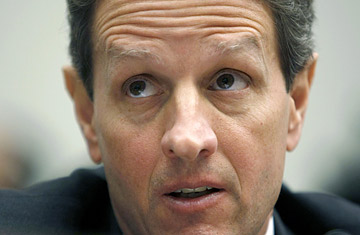
U.S. Treasury Secretary Timothy Geithner testifies before the House Financial Services Committee Hearing.
The transformation of Treasury Secretary Timothy Geithner will be remembered for its speed and unexpectedness. Just four weeks ago, on the heels of a failed presentation of the Administration's plan to help shore up banks, he was considered indecisive and incompetent. There were calls for him to step down until the President voiced support for his Treasury Secretary on a television talk show
Geithner left his whipping boy costume in the closet when he presented the specifics of his plan to get the private sector to participate in buying toxic assets. The financial world was focused on the reaction to his speech and, before he had even given it, the markets began a furious rally. Once he stepped away from the microphones, the buying of equities accelerated. (See pictures of the Top 10 scared traders.)
Geithner's success in convincing the world that hedge funds would use government money to buy bank paper of questionable value was all the more extraordinary because so few experts believe that the plan has any chance of working. It may be that the markets have been through such a long cycle of hopelessness that they are ready to grasp at any straw.
Clearly a student of the history of momentum in politics, Geithner decided to strike while the iron was hot. He and hapless Fed chairman Ben Bernanke went before Congress. Geithner, who was supposed to be unemployed last week, aimed high. He asked that Treasury to be given the power to essentially liquidate large non-bank financial institutions. The department would have the ability to seize a company like AIG, sell its assets, and manage its business to do as little harm to the global financial system as possible. All of this would be accomplished using taxpayer money, but there was no way for Geithner to come up with a more attractive alternative for funding the future initiative.
The extraordinary request that the Treasury be given plenary powers over the fate of a broad spectrum of financial firms would put it in a position where it could be judge, jury, and executioner in a case like AIG.
Geither was wise to use his unexpected popularity to ask for something that Congress would normally be reluctant to give. Spreading the regulation of the financial and credit systems around to a number of agencies has meant that one never became terribly powerful. Consequently, Congress could always keep its hand in the game by helping to decide which arms of the government should care for the most complex and, at this point, most troubled part of the system.
Geithner's request has its roots in the idea that the Treasury has more wise men than the balance of the federal government does, at least when it comes to fixing broken markets. Since the Treasury's policies are based on the whims of the Secretary, what Geithner is really saying is that he and he alone has the intellect and background to prevent future failures like AIG from happening again.
No one is that smart. Except, perhaps, Henry Paulson.
— Douglas A. McIntyre
